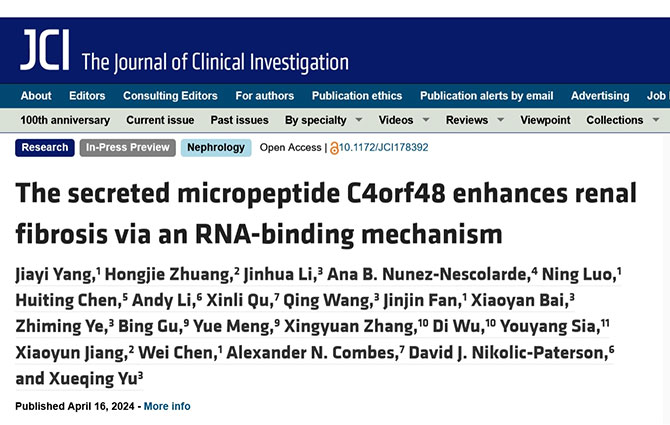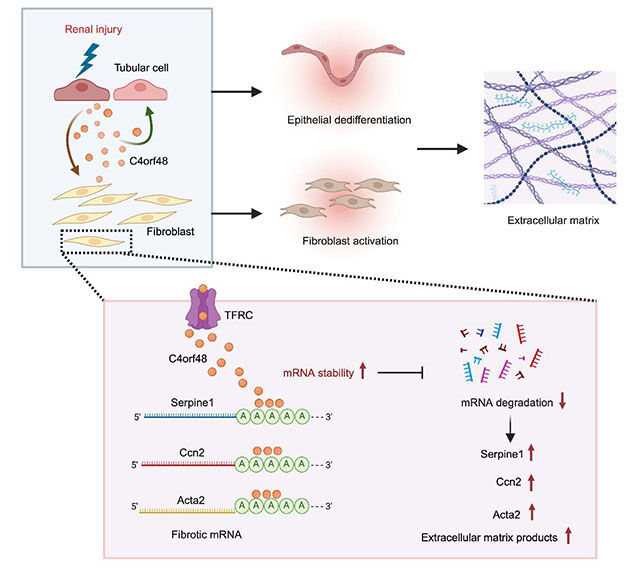

Approximately 8%–18% of adults in developed and developing countries worldwide suffer from chronic kidney disease (CKD). Diabetes and hypertension stand out as the two primary culprits behind CKD. Managing hyperglycemia, hypertension, and proteinuria, along with administering sodium/glucose cotransporter 2 inhibitors for type 2 diabetes, can slow but not stop the progression to end-stage renal disease. Patients with end-stage renal disease require renal replacement therapy, such as dialysis or kidney transplantation, which imposes significant burdens on both patients and their families, and incurs high medical costs. This urgent, unmet clinical need drives us to seek out new therapeutic targets to inhibit the deterioration of CKD.
The research team led by Professors Yu Xueqing, Li Jinhua, and Yang Jiayi from the Guangdong-Hong Kong Joint Laboratory for Immune and Genetic Research of Chronic Kidney Disease at Guangdong Provincial People's Hospital, published an article titled “The Secreted Micropeptide C4orf48 Enhances Renal Fibrosis via An RNA-Binding Mechanism” in the Journal of Clinical Investigation (Impact Factor: 15.9, 2022) on April 16, 2024. This study marks the first identification of the secreted micropeptide C4orf48 (Cf48) as a potential enhancer of renal fibrosis, promoting the production of extracellular matrix via an RNA-binding mechanism. Cf48 emerges as a potential biomarker for active fibrosis and a therapeutic target for CKD.

The research team identified an upregulation of the secreted micropeptide Cf48 through ribosome profiling in the renal tissues of mice with progressive diabetic kidney disease. Both mRNA and protein levels of Cf48 were elevated in renal tubular epithelial cells from humans and experimental models of CKD. Serum levels of Cf48 were found to be elevated in CKD patients, correlating with renal function loss, CKD stage advancement, and the degree of active interstitial fibrosis. Overexpression of Cf48 in mice accelerated renal fibrosis, while knockdown or knockout of the Cf48 gene significantly reduced renal fibrosis in CKD models. In vitro, recombinant Cf48 (rCf48) enhanced the fibrotic response induced by TGF-β1 in renal fibroblasts and epithelial cells, independent of Smad3 phosphorylation. Fibroblasts internalized Cf48 via transferrin receptor-mediated uptake, promoting the fibrotic response. RNA immunoprecipitation sequencing identified Cf48 binding to mRNA molecules involved in the fibrotic response, increasing mRNA half-life. Therefore, the secreted Cf48 micropeptide emerges as a potential enhancer of renal fibrosis, acting as an RNA-binding peptide to promote the production of extracellular matrix. This study utilized a single time-point cross-sectional design, indicating the need for future multicenter, longitudinal, and interventional clinical studies to further validate the role of Cf48 in CKD progression and its feasibility as a marker of active fibrosis.

Prof. Yang Jiayi from the First Affiliated Hospital of Sun Yat-sen University, Prof. Zhuang Hongjie, and Prof. Li Jinhua from Guangdong Provincial People’s Hospital are co-first authors of this article. Professors Li Jinhua and Yu Xueqing are the corresponding authors of the research paper.
Prof. Li Jinhua
Updated: April 21, 2024